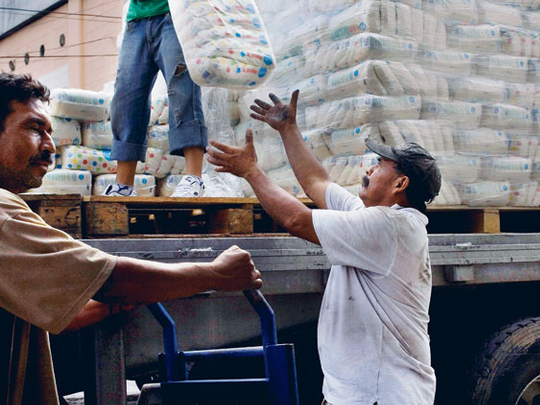
New York: Copper and a number of agricultural markets ended up on Friday as the euro rebounded but commodities remained vulnerable after last week's losses, which were among the year's worst, traders said.
Oil and gold two of the world's most widely traded commodities both settled down, continuing a trend seen through most of the week.
And the Reuters-Jefferies CRB index, the global commodities benchmark that tracks 19 mostly US traded futures markets, finished the week down 2.5 per cent despite a gain of more than a half per cent on the day.
May has been a particularly torrid month for the CRB, with index ending down in 10 out 15 sessions, as contagion from the European debt crisis spread globally.
"The markets are now clearly caught in a vortex of selling and seem to be ignoring any relative good news like the stabilising euro, while focusing on intangibles, such as the possibility of slowing growth," said Edward Meir, senior commodity analyst for broker MF Global in New York.
Trend
Meir said commodities could see some redemption from a rebound in equities, as was the case on Friday.
But if that does not become the trend, "we see no reason why the sell-off will not intensify even further from here", he said.
Copper used in construction and power settled up nearly 4 per cent on the day, helped by higher share prices on Wall Street and the euro's climb against the dollar.
The dollar is one of the most important factors determining commodity prices as any rally in the greenback like last week's four-years highs against the euro makes such materials more expensive for users of other currencies.
Copper's benchmark July contract in New York finished up 11.65 cents at $3.0610 a pound. On the week, it was down more than 2 per cent and for the year it was off 10 per cent.
"We have an ongoing confluence... concerns over Europe, concerns over China trying to slow things down, concerns over contagion, credit tightening, and a potential recession resurfacing," said John Gross, publisher of the Copper Journal.
He said for now, copper seemed oversold and due for rebound. "Whether [it]...turns into something more longer-lasting, is a flip of the coin."
Sugar and corn led agricultural markets higher after taking their cue from the rebound in the euro, copper and equities.
Raw sugar for July ended up 0.66 cent, or 4.4 per cent, at 15.65 cents a pound in New York its highest finish since April 26 after slipping to as low as 13 cents a pound two weeks ago.
July corn finished up almost 2 per cent at $3.96 a bushel.
Crude oil's front-month contract in New York finished down 1 per cent at $70.04 a barrel.
US crude has lost almost 20 per cent of its value since hitting 19-month highs of $87 a barrel on May 3.
High stockpiles
Aside from the euro zone contagion, the market has been battered by record high stockpiles of crude in the United States, the world's largest consumer of oil.
Gold's most actively-traded futures contract in New York, June, fell 1 per cent to $1,176.10 an ounce, moving further away from the key $1,200 level which had been the base for the precious metal's sprint to record highs last week.
"As of now, investors are more focused on selling gold to cover losses in other assets, particularly as stocks are falling, than seeing the metal as a safe haven," said Kazuhiko Saito, chief commodities analyst at futures trading company Fujitomi.
Spot gold, which reflects the price of bullion, was down 4 per cent on the week, hovering at around $1,176 an ounce in New York late Friday afternoon from the previous week's close of $1,230 and record high of nearly $1,250.
"Once this round of selling subsides, investors will think where is the best to put their money in light of fundamentals, helping to support liquid assets such as gold," said Wakako Harada, a senior trader at Mitsubishi Corp in Tokyo.












